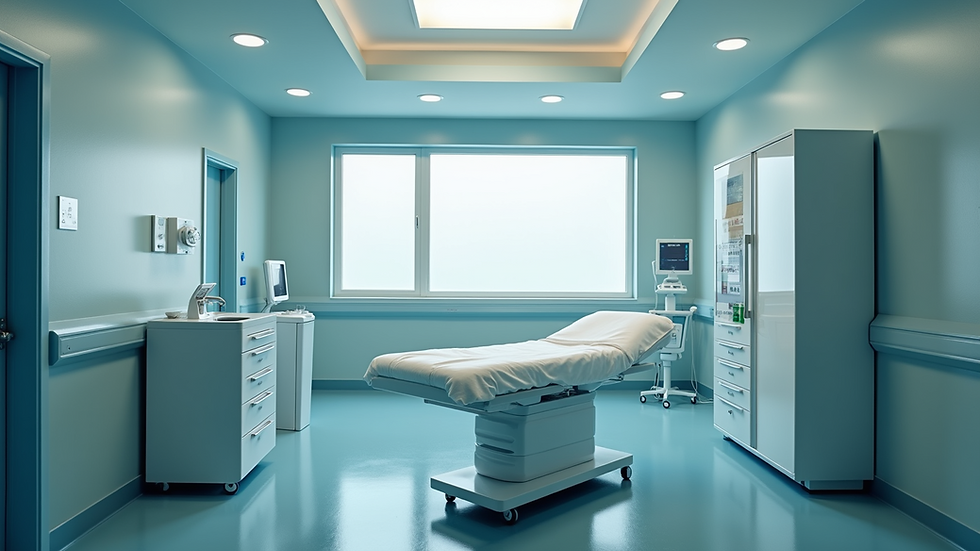What Happens During Hyperbaric Therapy: A Complete Guide
- Staff
- Jul 15, 2025
- 4 min read
Hyperbaric therapy is gaining attention as a treatment for various medical conditions. This innovative approach involves breathing pure oxygen in a pressurized environment, which stimulates healing and contributes positively to overall health. If you're curious about this fascinating therapy, join us on this journey to uncover the hyperbaric therapy process and what happens during treatment.
Hyperbaric Therapy Process
Hyperbaric therapy utilizes a hyperbaric chamber, which is specifically designed to increase atmospheric pressure. Patients enter the chamber, where they breathe pure oxygen. This process increases the amount of oxygen delivered to tissues and organs, promoting healing and recovery.
The Benefits of Hyperbaric Therapy
The benefits of hyperbaric therapy extend far beyond simple oxygenation. It is commonly used for conditions such as treating chronic wounds, chronic bone infections, delayed radiation injuries, compromised skin graft & flaps following surgery, and more. Research shows that hyperbaric oxygen therapy can also enhance recovery from surgeries and injuries that don't necessarily involve grafts or flaps.
For instance, a study published in the journal "Undersea & Hyperbaric Medicine" revealed that patients with diabetic foot ulcers experienced significant healing rates when treated with hyperbaric therapy. The therapy can also combat infections and reduce inflammation, effectively speeding up the healing process.

How the Hyperbaric Therapy Session Works
A typical hyperbaric therapy session begins with preparatory steps. Patients are given 100% cotton scrubs, they remove and store all jewelry and any removable devices that are not cleared for hyperbaric use, and refrain from using lotions, fragrances, makeup and hair products. Our technicians take and record patient vitals and go through a health & safety checklist. Once inside the chamber, patients lie down comfortably as the session begins.
The pressure in the chamber gradually increases, allowing patients to adjust and ensuring their comfort. Sessions last between 60 to 120 minutes, during which patients may relax, sleep, or watch TV. At ROC we have all streaming services available so patients will always have something to watch.
What to Expect During Your Session
During the hyperbaric therapy process, individuals may experience slight ear discomfort as pressure increases. This feeling is comparable to what one might encounter during a flight when ascending to cruising altitude. Patients can usually equalize this pressure by swallowing or yawning.
As the session progresses, participants will breathe pure oxygen. It is crucial to remain still and calm throughout the session; however, many find it a serene experience. Most patients report feeling relaxed, and some even fall asleep.
Safety and Side Effects
Safety is paramount in hyperbaric therapy at ROC. Our clinical staff include a doctor, a nurse practitioner, a nurse, a safety manager, and certified hyperbaric technicians ensuring all procedures adhere to strict guidelines. Although the therapy is very safe, some side effects may occur, including:
Pressure-Related Ear Issues: As mentioned earlier, this can usually be addressed easily.
Fatigue: Some patients feel tired after sessions, but this is typically short-lived.
Visual Changes: Increased pressure may cause temporary vision changes; however, these usually resolve quickly.
Rarely, more severe side effects, such as oxygen toxicity, has occurred, but at ROC we reduce that risk by including air breaks every 30 minutes where patients breath medical room air which provides a break from the pure oxygen. Our medical staff assess risks and guide patients through the therapy process to ensure their safety.
Preparing for Hyperbaric Therapy
Preparation is key to a successful hyperbaric therapy experience. Here are a few tips to ensure you're ready for your first session:
Consult Your Doctor: Before starting therapy, have a thorough discussion with your healthcare provider. This conversation will help determine whether hyperbaric therapy is right for you.
Follow Pre-Treatment Instructions: Adhere to any guidelines provided by our staff. This may include dietary restrictions or medication adjustments.
Arrive Early: Plan to arrive early on the day of your session to complete any paperwork and familiarize yourself with the facility.
By taking these steps, you'll ensure a smooth transition into the therapy process.

Long-Term Effects of Hyperbaric Therapy
Many patients wonder about the long-term effects of hyperbaric therapy on their health. Regular sessions may yield significant, lasting benefits. Studies indicate that individuals who undergo therapy for underlying conditions may experience symptomatic relief, improved tissue regeneration, and enhanced overall well-being.
While hyperbaric therapy is not a cure-all, its use as a complementary treatment can provide value in addressing chronic conditions and revitalizing health.
Key Takeaways
Hyperbaric therapy is a powerful tool for healing that can significantly benefit those undergoing treatment for various medical issues. This innovative therapy process improves oxygen delivery to tissues, enhances healing, and promotes well-being. If you’re considering this form of therapy, remember to consult with your healthcare provider and ensure you understand what to expect during your sessions. Additionally, at ROC we do not require a referral from a provider, so potential patients can contact us directly to discuss options and whether insurance will cover treatments or not.
With its unique approach to healing, hyperbaric therapy represents an exciting frontier in medical treatments, offering hope to many and enhancing the quality of life for individuals seeking recovery.
In summary, understanding the hyperbaric therapy process can demystify this treatment and help you make informed decisions. If you're interested in learning more about the specific benefits and what to expect during your sessions, call our office at
859-420-6362 or email at info@rochyperbarics.com




Comments